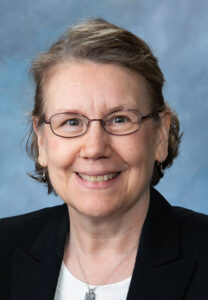By Michele Petersen
SAU Theological Perspective
The Catholic Church is at its best when it imparts a sense of mystery about God and about human life in and through the celebration of the liturgy. The days of Lent are an especially good time to

reflect on the meaning of the Paschal Mystery in our own lives. There is no better modern saint to light the way into the mystery of this Trinitarian relationship than St. Teresa Benedicta of the Cross, or Edith Stein, as she is better known.
Stein was born into a large Jewish family in Breslau, Germany, now Wroclaw, Poland to Auguste and Siegfried Stein in 1891. Although her father died when she was young, she enjoyed a vibrant family life and was a devoted daughter, sister and aunt. She was a bright, precocious student and went on to attend university in Breslau where she applied her brilliant intellect to the new field of phenomenology and to the study of what is “real” in human life. She earned a doctorate in philosophy at the University of Freiburg and continued to cultivate friendships there that would last throughout her lifetime.
Following a period of existential angst, and after reading the autobiography of St. Teresa of Avila, Stein was baptized in the Catholic Church in 1922. She pursued a passionate life of prayer and an intense intellectual search for truth and meaning. She taught, wrote and presented lectures to Catholic groups throughout Europe before entering the Cologne Carmel in 1933. Later, she was transferred to the Carmel in Echt, in the Netherlands, where she and her sister, Rosa, were arrested and taken away by the Gestapo on Aug. 2, 1942, when the Dutch bishops spoke out against the Nazis. A week later, on Aug. 9, she entered the Auschwitz-Birkenau extermination camp where she was gassed to death. She was beatified in 1987 in Cologne and canonized in 1998 in Rome. She is co-patron of Europe.
While the Carmelite saint St. Thérèse of Lisieux is popularly known as the saint of “the little way,” one way to think of St. Teresa Benedicta a Cruce is as “the way of being on the way.” Think of it as walking hand-in-hand with faith and reason and in dialogue and loving encounter with the world. Stein never lost sight of our human solidarity and the unity of the human family. This is evidenced in her writings and as witnessed by a stationmaster who recognized her as he watched her from a platform calmly comfort mothers and children on the packed train that would take all of them to their final destination in the East.
Stein was aware of the great pain and suffering she caused her mother who was a devout, observant Jew. She treasured her family and her Jewish roots. As testimony to her Jewish origin, today her mother’s Hebrew prayer book sits behind glass on a shelf alongside Stein’s other personal books at the Edith Stein Archive at the Carmelite Convent of Mary of Peace, or Maria vom Frieden, in Cologne. She spent several hours in prayer in the church there before leaving Germany for the last time on New Year’s Eve, 1938.
Stein lived a well-integrated life of prayer and study. She understood the need for a philosophy and spirituality of individuality (as distinct from our cultural obsession with a narcissistic form of individualism). It is interesting to note that both St. John Henry Newman and Stein used the word, “tripersonal,” when discussing participation in the life of the Trinity.
She wrote her doctoral dissertation “On the Problem of Empathy,” which is an attempt to explain how we can live more intentional lives by reaching out and feeling with the situation of another person (as distinct from compassion whereby we suffer with someone). This respects distance in intimacy, and the chasm that separates one human from another, but also unites us as we live in conscious solidarity with and relate in real time with the other (CWES 3). This thought is especially applicable to social justice work today in our reaching out to someone in immediate need of our assistance even as we can choose to confront and challenge the injustice that caused the need in the first place.
Stein was a gifted philosopher. She expands the notion of intentionality beyond the work of Martin Heidegger who develops the temporality of finite being. She takes intentionality to the point of self-transcendence in personal self-giving, which is for her the relational awareness of eternal being (CWES, 9). Theologically, it is being-in-the-world-in-tripersonal relationship.
Stein understands that all persons are instruments. One has to listen in order to have a sense of the other. A spiritual transformation is effected in a relationship that has as its motivation love, such that the capacity to receive and give love freely for the sake of God grows and is related to the search for truth as our knowledge of reality grows.
She is a realist, and accepts what is and brings love as a real presence to the depravities and horror of war and violence. She teaches us how to live life in common, in community, with both passivity and moral agency in tandem, and which faith renders productive. The meaningful coherence of her thought gives testimony to her integrity. Edith Stein is a saint of human mystery and a light in dark times.
(Michele Petersen, Ph.D., is a visiting assistant professor of Theology and Philosophy at St. Ambrose University in Davenport. She is a parishioner of St. Thomas More Parish, Coralville, and author of “A Hermeneutics of Contemplative Silence: Paul Ricoeur, Edith Stein, and the Heart of Meaning.”)











